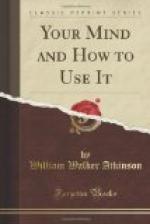Let us take an actual situation that may arise in study and see how this applies. Suppose you are in your room studying about Charlemagne, a page of your history text occupying the centre of your attention. The marginal distractions in such a case would consist, first, in external sensations, such as the glare from your study-lamp, the hissing of the radiator, the practising of a neighboring vocalist, the rattle of passing street-cars. The bodily distractions might consist of sensations of weariness referred to the back, the arms and the eyes, and fainter sensations from the digestive organs, heart and lungs. The irrelevant ideas might consist of thoughts about a German lesson which you are going to study, visions of a face, or thoughts about some social engagement. These marginal objects are in the mind even when you conscientiously focus your mind upon the history lesson, and, though vague, they try to force their way into the focus and become clear. The task of paying attention, then, consists in maintaining the desired object at the centre of the mental field and keeping the distractions away. With this definition of attention, we see that in order to increase the effectiveness of attention during study, we must devise means for overcoming the distractions peculiar to study. Obviously the first thing is to eliminate every distraction possible. Such a plan of elimination may require a radical rearrangement of study conditions, for students often fail to realize how wretched their conditions of study are from a psychological standpoint. They attempt to study in rooms with two or three others who talk and move about continually; they drop down in any spot in the library and expose themselves needlessly to a great number of distractions. If you wish to become a good student, you must prepare conditions as favorable as possible for study. Choose a quiet room to live in, free from distracting sounds and sights. Have your room at a temperature neither too hot nor too cold; 68 deg. F. is usually considered favorable for study. When reading in the library,




